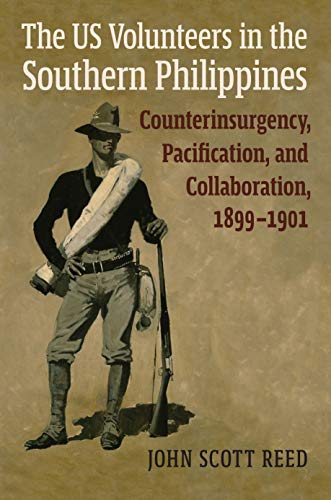The US Volunteers in the Southern Philippines
Counterinsurgency, Pacification, and Collaboration, 1899-1901 (Modern War Studies)
John Scott Reed
BOOK REVIEW

In the heart of the Pacific, far from the political clamor of Washington D.C., lay an often-overlooked chapter of American history that resonates with current-day implications: the insurrection and occupation of the Philippines during the dawn of the 20th century. The US Volunteers in the Southern Philippines: Counterinsurgency, Pacification, and Collaboration, 1899-1901 by John Scott Reed immersive dives into this turbulent period, revealing the intricate web of military strategies, cultural clashes, and societal transformations that occurred as America sought its place on the global stage.
What makes this work not just another historical account is its unyielding commitment to humanizing the soldiers-the volunteers-who were caught in the crossfire of their nation's imperial ambitions and the complexities of colonial governance. Reed's meticulous research transcends mere dates and battles, pulling readers into the visceral experiences of those who lived through it. Each chapter pulsates with the beating heart of conflict, portraying real figures who bore the weight of decisions that altered lives irrevocably.
In the aftermath of the Spanish-American War, the United States stood at a crossroads, grappling with the duality of its identity as a burgeoning empire and a democracy grounded in ideals of liberty. Reed tackles the clashes between the ethos of manifest destiny and the grim realities of counterinsurgency warfare, illuminating how the U.S. military employed pacification tactics in the Southern Philippines. This nuanced portrayal interjects a necessary critique into historical narratives often sanitized to serve national narratives.
Readers initially drawn to military history will find themselves ensnared by the emotional gravity of personal stories woven throughout Reed's discourse. The complexities of collaboration amidst a backdrop of violence and resistance are laid bare, challenging many preconceived notions of "justice" and "civilization." As Reed outlines the moral ambiguities faced by soldiers and officers, the historical narrative itches uncomfortably, forcing you to confront the legacy of American imperialism.
Critics of the work, however, express concerns about its dense academic style, arguing that the richness of Reed's analysis sometimes drowns out a broader accessibility for the casual reader. Yet, this only deepens the reward for those who persist, as the payoff reveals profound insights that resonate beyond historical confines. Here lies a texture of historical consciousness that speaks to our present-day realities-an echo of geopolitics that still influences U.S. relations with former colonies and current international policies.
But the true genius of The US Volunteers in the Southern Philippines emerges through its reflection on the human condition. The soldiers, confronted with a foreign adversary, grappled not only with external foes but also with internal conflicts-doubt, regret, empathy. Reed's narrative captures the essence of these complexities vividly, igniting a spark of compassion within us, provoking reflection on our current global engagements.
This exploration of counterinsurgency and its consequences isn't just academic; it's an urgent conversation ignited by the flames of our own time-racial tensions, military interventions, and debates over national identity echo across the ages. Reed compels us to acknowledge the cycles of history, evoking a sense of urgency and relevance that can't be easily dismissed. It's an invitation to dissect the moral fabric of our actions as citizens, not just as observers of politics.
As readers grapple with the pages, they uncover the profound ethical dilemmas facing the volunteers while fostering a transformative understanding of the power dynamics at play. It is more than just an account of warfare; it's a call to bear witness to history with courageous honesty.
In conclusion, John Scott Reed does not simply recount the past-he compels us to confront it, allowing the ghosts of history to seep into our collective consciousness. Engulfed in the tapestry of struggle and survival, The US Volunteers in the Southern Philippines redefines our understanding of courage and complicity, engaging our hearts and minds in a debate that should never grow stale. The weight of your own conscience might just urge you to reconsider how we coexist in a world still deeply influenced by these historical legacies. 🌍✊️
📖 The US Volunteers in the Southern Philippines: Counterinsurgency, Pacification, and Collaboration, 1899-1901 (Modern War Studies)
✍ by John Scott Reed
🧾 328 pages
2020
#volunteers #southern #philippines #counterinsurgency #pacification #collaboration #1899 #1901 #modern #studies #john #scott #reed #JohnScottReed